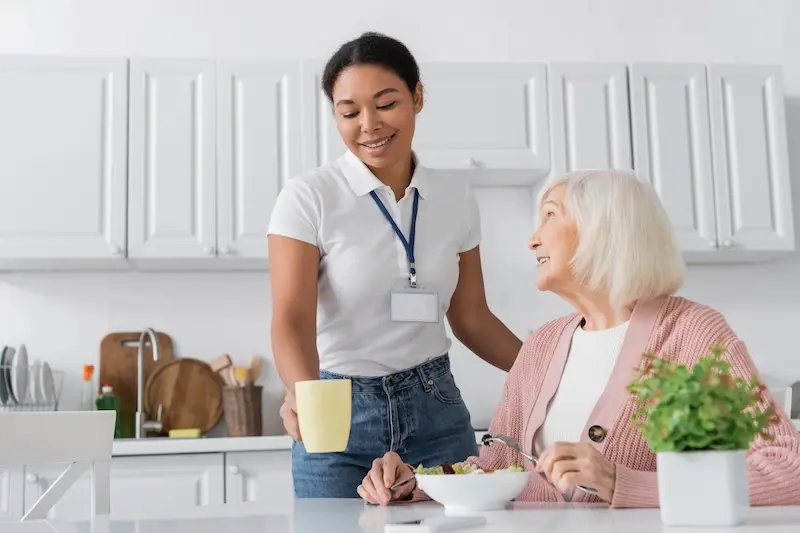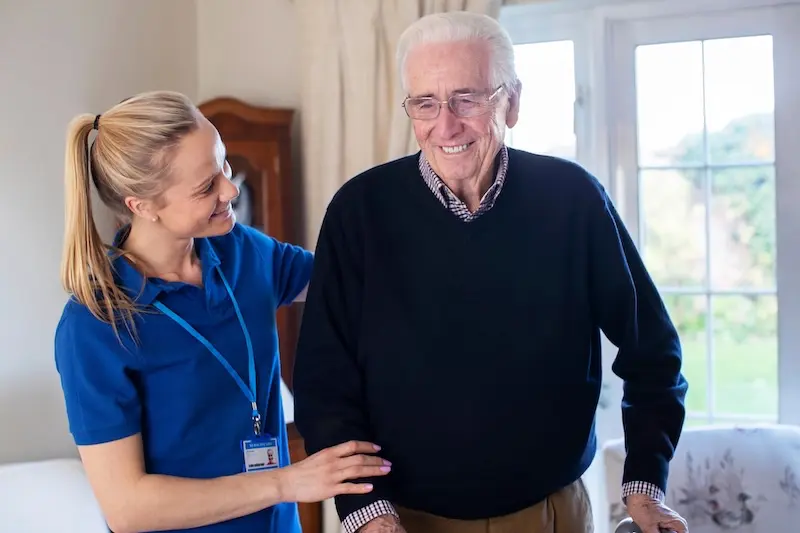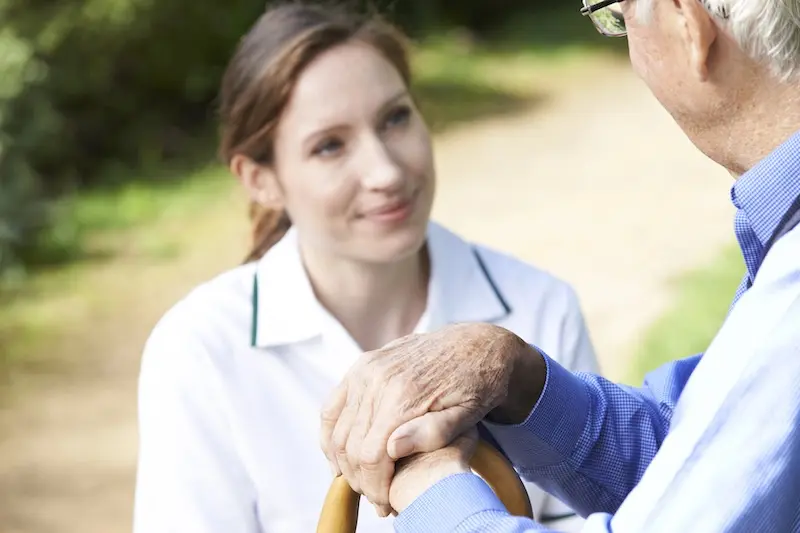Becoming a home caregiver is a meaningful way to support others while building a fulfilling and flexible career. For those who value empathy, independence, and making a tangible difference, this role offers the chance to help individuals live safely and comfortably in their own homes. As the demand for home care services grows across Ireland, so too does the need for compassionate, reliable caregivers.
In this article, we explore what makes a great caregiver, the qualifications and training required, and what daily life in the role looks like. Whether you’re thinking about a career change or just beginning your journey, this is your starting point to see if becoming a home caregiver is right for you.
Is becoming a home caregiver the right fit for you?
Before stepping into the world of home caregiving, it’s important to reflect on whether this path aligns with your personality, values, and lifestyle.
Becoming a home caregiver is a profession that involves deep personal commitment and the desire to make a real difference in people’s lives. Whether supporting an elderly person or someone with a disability, caregivers help clients maintain dignity, independence, and comfort within the familiar setting of their own home.
If you’re someone who feels called to care for others, this section will help you explore what the role truly involves, from essential personal traits to the realities of day-to-day tasks.
The qualities needed to be a great home carer
Great caregivers often share a core set of traits that help them provide consistent, compassionate, and person-centred support. These qualities not only enhance the care experience but also make the role more rewarding:
- Empathy and compassion: The foundation of good care, allowing you to understand and respond to a client’s emotional and physical needs with kindness.
- Emotional resilience: Essential for managing the emotional highs and lows of caregiving, particularly when dealing with illness, decline, or loss.
- Strong communication skills: Including clear verbal expression, active listening, and the ability to explain things calmly and patiently to clients and families.
- Reliability: Clients rely heavily on caregivers to show up on time, follow through on tasks, and provide consistent care.
- Respect for boundaries: The ability to maintain professional relationships while still offering warmth and support.
- Cultural sensitivity and respect for dignity: Recognising and honouring a person’s background, values, and individuality.
- Patience: Crucial when supporting clients with slower mobility, memory issues, or other challenges that require a calm and steady approach.
- A sense of humour: Often helps lighten the mood, ease tension, and build trust.
- Attention to detail: Important for noticing small changes in a client’s routine, mood, or behaviour that may need to be flagged or supported appropriately.
Possessing these traits can help you thrive in the role and make a real difference in the lives of those you care for.
Understanding the day-to-day role
The daily responsibilities of a home caregiver are diverse and can vary based on the needs of each client. Typical duties include assisting with personal care, such as bathing, dressing, and toileting, and providing companionship, which can be just as vital for emotional well-being as physical support.
Caregivers also carry out light household tasks, prepare meals, and help maintain a clean and safe living space. In many cases, they provide mobility support, helping clients move around the house safely or get to appointments.
Navigating between appointments requires good time management and adaptability. Caregivers often support clients with medication reminders, assist with shopping or errands, and encourage participation in social or community activities.
The job is dynamic, and each day can bring new challenges or opportunities to make a positive impact.

The qualifications and training you’ll need
To begin a career in home caregiving, certain qualifications and certifications are required.
In Ireland, the most essential is a QQI Level 5 qualification, often with modules in Care Skills and Care of the Older Person. This training ensures caregivers understand best practices for safety, hygiene, and personal support.
However, caregiving is a profession where learning never really stops. There are numerous opportunities to upskill, specialise, and grow within the field, whether you aim to focus on elder care, disability services, or eventually transition into nursing or social care roles.
What you need to start the job
Before starting work as a home caregiver, you’ll need to meet several key requirements:
- QQI Level 5 qualifications in Care Skills and Care of the Older Person
- Legal right to work in Ireland
- Garda vetting clearance
- Two cross-checked references
- Basic English language skills for communication and record-keeping
- A valid driver’s licence is preferred, especially for roles involving travel between clients
These requirements help ensure you’re well-prepared for the role and able to provide safe, effective care from day one.
Upskilling and continuous learning opportunities
One of the rewarding aspects of caregiving is the wide range of training available to help you grow professionally. Courses such as manual handling and patient lifting, elder mental health awareness, and first aid are commonly offered. Induction training from employers often includes guidance on organisational policies, safeguarding practices, and infection prevention.
Caregivers can also choose to specialise by pursuing modules in dementia care, palliative care, or disability services. For those interested in long-term career growth, pathways into nursing or healthcare management are available with further education.
Training in areas such as elder abuse awareness and infection control not only enhances your skills but ensures the safety and dignity of the people you support, while upskilling keeps your knowledge and care practices in line with current standards.
Some practical realities to consider before applying
While caregiving can be deeply fulfilling, it’s essential to be aware of the day-to-day realities. The role demands physical stamina, emotional resilience, and excellent time management skills. From assisting clients with mobility to managing emotionally challenging situations, such as the decline or passing of a client, caregivers must be prepared for both the joys and the challenges.
Understanding the realities of working in home care will help you make an informed decision about whether this role suits your lifestyle and strengths.
Work schedules, flexibility, and routine
Caregiving roles can offer flexibility, but they also require adaptability. Work schedules may include:
- Part-time, full-time, or flexible shifts
- Evening and weekend work, depending on client needs
- Travelling between clients
- Managing multiple appointments per day, often with varying routines
Caregivers must be organised, punctual, and able to adjust plans when things change unexpectedly. Self-care and energy management are key to staying resilient in a role that often requires giving so much to others.
The emotional and physical demands of the role
The role of a caregiver can be emotionally intense and physically demanding. You may find yourself supporting clients through declining health, navigating complex family dynamics, or managing your reactions to emotionally charged situations.
Physically, the job often involves lifting, assisting with movement, and being on your feet for extended periods. It’s important to stay mindful of your well-being, build resilience, take breaks when needed, and seek support when facing tough days.
Despite the challenges, many caregivers find the work deeply meaningful. Making a difference in someone’s daily life, offering comfort and dignity, and building genuine human connections often outweigh the demands.
If you’re someone who thrives on helping others, values flexibility, and has the emotional strength to navigate both joy and hardship, caregiving could be one of the most fulfilling paths you’ll ever take.

Start your journey to becoming a home caregiver with us
Becoming a home caregiver is more than a job; it’s a calling to support others with compassion, dignity, and respect. If you value empathy, independence, and meaningful work, this could be the perfect path for you. Yes, the role brings emotional and physical challenges, but for those who are passionate about helping others, the rewards are deeply fulfilling: real human connection, personal growth, and the chance to make a lasting impact.
At Blanchardstown & Inner City Home Care, we’ve been empowering caregivers and supporting local communities for over 21 years. As a not-for-profit organisation, we reinvest in our staff through continuous training, flexible contracts, and a culture built on kindness and recognition. Our carers enjoy benefits like:
- Flexible part-time and full-time hours
- Mileage allowances and premium pay for evenings and weekends
- Free uniforms and out-of-hours support
- A welcoming team culture with Carer of the Month awards and ongoing appreciation
- A comprehensive induction programme and continuous learning opportunities
If you’re ready to make a difference, now is the time to take the next step. Join a passionate and supportive team that puts people first, values your contribution, and gives you the tools to thrive.
Apply today and start your journey; your community needs you!


